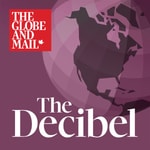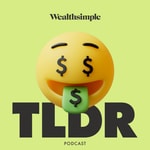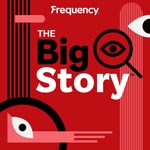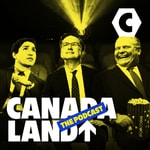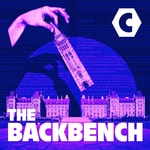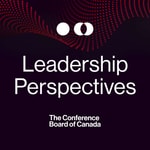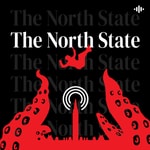The Hatchet – Détails, épisodes et analyse
Détails du podcast
Informations techniques et générales issues du flux RSS du podcast.
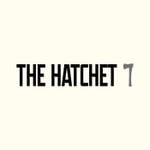
The Hatchet
Hatchet Media
Fréquence : 1 épisode/8j. Total Éps: 28

hatchetmedia.substack.com
Classements récents
Dernières positions dans les classements Apple Podcasts et Spotify.
Apple Podcasts
🇨🇦 Canada - business
03/08/2025#10🇨🇦 Canada - business
02/08/2025#8🇨🇦 Canada - business
01/08/2025#23🇨🇦 Canada - business
31/07/2025#35🇨🇦 Canada - business
25/07/2025#70🇨🇦 Canada - business
24/07/2025#95🇨🇦 Canada - business
23/07/2025#61🇨🇦 Canada - business
22/07/2025#55🇨🇦 Canada - business
21/07/2025#37🇨🇦 Canada - business
20/07/2025#52
Spotify
Aucun classement récent disponible
Liens partagés entre épisodes et podcasts
Liens présents dans les descriptions d'épisodes et autres podcasts les utilisant également.
See allQualité et score du flux RSS
Évaluation technique de la qualité et de la structure du flux RSS.
See allScore global : 49%
Historique des publications
Répartition mensuelle des publications d'épisodes au fil des années.
Canada's Criminal Bank: A Triptych on TD
jeudi 28 novembre 2024 • Durée 46:47
TD Bank has over a hundred thousand employees, almost two trillion dollars in assets and it’s a foundational part of the Canadian economy.
It’s also a criminal enterprise.
TD Bank has now admitted that for years, they helped launder hundreds of millions of dollars in drug money in the United States. But TD’s bad behaviour goes much further back. And leads us a lot closer to home.
Featured in this episode: Michael Sallah (Pittsburgh Post-Gazette), Robert Cribb (Toronto Star)
To learn more
“TD Bank’s dirty laundry: Inside the cultural shift that seeded a money laundering crisis, succession woes and a leadership exodus” by Tim Kiladze, Rita Trichur James Bradshaw and Stefanie Marotta in The Globe and Mail
“Pirate of the Caribbean” by Bryan Burrough in Vanity Fair
“How Italy’s ’Ndrangheta mafia allegedly infiltrated Canadian banks” by Brian Fitzpatrick, Robert Cribb, Jared Ferrie, Alessia Candito, & Alessia Cerantola in The Toronto Star, OCCRP & La Repubblica
Support us at hatchetmedia.substack.com
The Hatchet is a podcast and newsletter dedicated to exposing power and money in Canada. Every week, we’re going to deliver important, original and fascinating journalism about how this country actually works, and we’re going to do it in a way that no one else can.
This is a public episode. If you'd like to discuss this with other subscribers or get access to bonus episodes, visit hatchetmedia.substack.com/subscribe
First Came Bread. Are They Fixing the Price of Meat and Potatoes Too?
vendredi 6 décembre 2024 • Durée 23:25
The price of food keeps rising. And for the last few years, we’ve had a national debate about whether or not that’s the fault of the mega grocery chains.
But the CEOs of Loblaws, Metro and Sobeys claim that it’s not their fault. We should be looking further up the food chain for the real culprits.
They might have a point. Everywhere you look in the food industry, you’ll find rapacious corporate oligopolies. The grocery chains might have fixed the price of bread. But there’s credible accusations that other companies are fixing the price of meat, potatoes and much more.
Featured in this episode: Jeff Yorga, Keldon Bester, Denise Hearn
To learn more
The Big Fix: How Companies Capture Markets and Harm Canadians by Denise Hearn & Vass Bednar
From Plow to Pantry: Monopoly in the Canadian Food System by Andrew Nixon & Keldon Bester
“Alleged 'potato cartel' accused of conspiring to raise price of frozen fries, tater tots across U.S.” by Rhianna Schmunk in CBC News
“Sask. cattle producers call for meat pricing investigation, transparency” by Kendall Latimer in CBC News
Support us at hatchetmedia.substack.com
The Hatchet is a podcast and newsletter dedicated to exposing power and money in Canada. Every week, we’re going to deliver important, original and fascinating journalism about how this country actually works, and we’re going to do it in a way that no one else can.
This is a public episode. If you'd like to discuss this with other subscribers or get access to bonus episodes, visit hatchetmedia.substack.com/subscribe
How the Indian Government Extorts Canadians Into Becoming Spies
vendredi 13 décembre 2024 • Durée 26:40
An open secret among Canadian Sikhs is only now being spoken about publicly.
For years, Indian officials have used visa approvals to extort and blackmail their critics in Canada. They’ve coerced Canadians to spy on their fellow citizens or denounce their political beliefs in writing, in exchange for the privilege of being able to visit loved ones in India.
It’s just a small part of the foreign interference machine that India has built on Canadian soil.
Featured in this episode: Stewart Bell (Global News)
To learn more
“Investigation: Visas have become an Indian foreign interference tool” by Stewart Bell & Jeff Semple in Global News
“Contract to Kill” by CBC’s The Fifth Estate
Support us at hatchetmedia.substack.com
The Hatchet is a podcast and newsletter dedicated to exposing power and money in Canada. Every week, we’re going to deliver important, original and fascinating journalism about how this country actually works, and we’re going to do it in a way that no one else can.
This is a public episode. If you'd like to discuss this with other subscribers or get access to bonus episodes, visit hatchetmedia.substack.com/subscribe
Canada’s Economy Is Even More Screwed Up Than You Think
vendredi 20 décembre 2024 • Durée 44:49
Support us at hatchetmedia.substack.com
I think we all know that the Canadian economy isn’t doing great. In the years after the pandemic, inflation surged and everyday people had to deal with ever-rising prices on all kinds of staple goods.
The former governor of the Bank of Canada Stephen Poloz said recently that it’s likely that Canada’s already in a recession, and we just don’t know it yet.
And now, even the people in charge of the economy are in chaos. Chrystia Freeland, the finance minister resigned, claiming that she can’t tolerate the political gimmicks being forced on her by the Prime Minister’s Office.
And the threat of massive tariffs from the incoming Trump administration could pulverize Canadian industry in upcoming years.
But the problems with Canada’s economy go much deeper than even all that. For the last few decades, economists have pointed to Canada’s absolutely anemic rates of productivity, which measures how efficient an economy is.
The housing crisis continues to be one of the very worst in the world. And no political party seems to be offering up any real solutions to any of our problems.
And that’s why I wanted to talk to John Rapley. He’s an economics columnist for the Globe and Mail and the author of a number of books, including Why Empires Fall: Rome, America and the Future of the West, and one of the sharpest thinkers on all things economic.
We caught up with him while he was in South Africa and on the day after Freeland’s dramatic resignation.
Featured in this episode: John Rapley
To learn more
“The ‘vibecession’ is real, and economists must do some soul-searching” by John Rapley in The Globe and Mail
“Bless this house: Why Canadians put so much faith in the housing market” by John Rapley in The Globe and Mail
Why Empires Fall: Rome, America, and the Future of the West by Peter Heather & John Rapley
The Hatchet is a podcast and newsletter dedicated to exposing power and money in Canada. Every week, we’re going to deliver important, original and fascinating journalism about how this country actually works, and we’re going to do it in a way that no one else can.
Music: I dunno by grapes (c) copyright 2008 Licensed under a Creative Commons Attribution (3.0) license. Ft: J Lang, Morusque
This is a public episode. If you'd like to discuss this with other subscribers or get access to bonus episodes, visit hatchetmedia.substack.com/subscribe
The Only Certainties in Canada are Death and Tax Havens
vendredi 10 janvier 2025 • Durée 24:44
So everyone seems pretty worried about a potential trade war with the United States. And for good reason — the US is our biggest trading partner by far.
And I bet that over the next couple of days and weeks, a lot of journalists are going to head over to the StatsCan website to look up numbers of just how much money flows between the two countries.
If they do, they might find themselves looking at a chart that shows Canadian foreign direct investment. It shows how much Canadian firms, individuals and institutions are investing in different countries. And, of course, the US is right at the top of the list, with just over a trillion dollars.
But it’s the rest of the list that I find especially interesting. Do you know which country ranks second?
Bermuda.
In 2023, there was more than $135 billion invested in Bermuda that came from Canada.
Bermuda is a tiny British Overseas Territory with a population just over 64,000. That $2.1 million dollars for every resident of Bermuda.
Now Bermuda is not exactly an industrial powerhouse. This money is not being used to build new factories or invest in exciting new Bermudian industries.
Everyone knows what’s happening. Bermuda is a tax haven. Almost to a dollar, that $135 billion dollars in Bermuda is for companies to avoid paying Canadian taxes.
So what the hell is going on here? The truth is that government after government has made it easier for companies to avoid paying taxes in this country, depriving Canadians of billions of dollars in revenue. That’s money that could be spent on social programs or addressing the budget deficit or lowering taxes on everyday people
So how did we get here? And do any of the political parties have the guts to do anything about this?
Featured in this episode: Alain Denault, Silas Xuereb
To learn more
Canada: A New Tax Haven by Alain Deneault & translated by Catherine Browne
“Deals Canada signed to catch tax cheats allow billions in taxes to escape” by Zach Dubinsky in CBC News
“Foreign direct investment, 2023” in The Daily from Statistics Canada
Support us at hatchetmedia.substack.com
The Hatchet is a podcast and newsletter dedicated to exposing power and money in Canada. Every week, we’re going to deliver important, original and fascinating journalism about how this country actually works, and we’re going to do it in a way that no one else can.
Music: I dunno by grapes (c) copyright 2008 Licensed under a Creative Commons Attribution (3.0) license. Ft: J Lang, Morusque
This is a public episode. If you'd like to discuss this with other subscribers or get access to bonus episodes, visit hatchetmedia.substack.com/subscribe
How Pretendians and Grifters Infiltrated a Billion Dollar Federal Strategy
vendredi 17 janvier 2025 • Durée 24:59
You’ve probably heard some of the controversy swirling around ArriveCan; how one of the contracts to help build it went to a company owned by a federal government employee. And especially how the whole thing cost $60 million to make, even though, you know, it was a pretty basic app.
But ArriveCan was also the beneficiary of a specific strategy that the federal government has been implementing for nearly three decades. It’s known as the Procurement Strategy for Indigenous Business.
And the idea is simple. A certain percentage of government contracts should go to businesses owned and operated by Indigenous people.
Which on paper sounds reasonable. You could think of it as reconciliation-via-contracting.
Under the Trudeau government, the strategy was expanded, with the government aiming to have 5 per cent of their contracts go to Indigenous-owned businesses.
But here’s the problem. For a very long time, nobody was really checking upfront whether or not a business was actually “Indigenous” in any meaningful way.
And there’s good reason to believe that many of them simply weren’t.
The stakes for a story like this really couldn’t be higher. It’s not only the billions of dollars in taxpayer money. But it’s the government’s ability to deliver the services that Canadians depend on. And economic reconciliation with First Nations, Inuit and Métis.
Featured in this episode: Patti Sonntag (Global News/The National Post)
To learn more
“Billions in federal contracts awarded to ‘Indigenous’ enterprises without verification” by Patti Sonntag, Melissa Ridgen, Hannah Sangster, Celeste Bird & Alex Boutilier in Global News
“Underneath the ArriveCan scandal, questions swirl about Ottawa’s Indigenous procurement requirements” by Bill Curry, Tom Cardoso & Kristy Kirkup in The Globe and Mail
“Liberal minister's former business questioned over 'Indigenous' claims in government contract bids” by Patti Sonntag in The National Post
“How one nursing company tapped into Ottawa’s Indigenous businesses program, despite not being Indigenous” by Bill Curry in The Globe and Mail
Support us at hatchetmedia.substack.com
The Hatchet is a podcast and newsletter dedicated to exposing power and money in Canada. Every week, we’re going to deliver important, original and fascinating journalism about how this country actually works, and we’re going to do it in a way that no one else can.
Music: I dunno by grapes (c) copyright 2008 Licensed under a Creative Commons Attribution (3.0) license. Ft: J Lang, Morusque
This is a public episode. If you'd like to discuss this with other subscribers or get access to bonus episodes, visit hatchetmedia.substack.com/subscribe
The Last of the Pirates
vendredi 31 janvier 2025 • Durée 49:20
When Paul Watson was arrested in July of last year, it made headlines around the world. The presidents of France and Brazil called for his immediate release.
But here in Canada — Watson’s birthplace and where much of his activism has centred — the reaction was strangely muted.
Prime Minister Justin Trudeau never said a word about his case. While there was some news coverage of his case, it was nothing like the attention his arrest received in other countries.
Which is surprising. Not only is Watson a founder of Greenpeace and one of the most famous environmental activists in the world, he’s also one of the most controversial. Many have labelled him as an eco-terrorist because of his willingness to use almost any means necessary to achieve his goals.
Nowhere is this more obvious than his decades-long campaign against Japanese whaling in the Southern Ocean. On a rickety ship, with a neophyte crew, Watson went to war against the illegal Japanese whale hunt, ramming their ships in the open seas.
He’s been called a pirate, and it’s a label he accepts willingly.
This is a story about more than just whales. It’s about a planet on the brink of ecological collapse. And the lengths that one man is willing to go to try to stop it.
Featured in this episode: Peter Heller
To learn more
The Whale Warriors: The Battle at the Bottom of the World to Save the Planet’s Largest Mammals by Peter Heller
Watson (2019) by Lesley Chilcott
“‘They want revenge’: Canadian co-founder of Greenpeace, Paul Watson, awaits extradition hearing in Greenland jail” by Linsday Jones in The Globe and Mail
Support us at hatchetmedia.substack.com
The Hatchet is a podcast and newsletter dedicated to exposing power and money in Canada. Every week, we’re going to deliver important, original and fascinating journalism about how this country actually works, and we’re going to do it in a way that no one else can.
Music: I dunno by grapes (c) copyright 2008 Licensed under a Creative Commons Attribution (3.0) license. Ft: J Lang, Morusque
This is a public episode. If you'd like to discuss this with other subscribers or get access to bonus episodes, visit hatchetmedia.substack.com/subscribe
The 51st State of Emergency
mardi 18 février 2025 • Durée 32:16
It’s been a weird month.
When we first launched The Hatchet, we spent a lot of time talking about the kinds of stories that we wanted to cover and the kind of work that we wanted to do here. Something we did not anticipate was having to seriously entertain the notion of American annexation.
But here we are. And so on today’s episode of The Hatchet, we’re going to talk about the tarrifs, the history of Canada-U.S. integration, the future of continentalism and whether or not we can survive Trump’s attacks on our sovereignty.
Support us at hatchetmedia.substack.com
This is a public episode. If you'd like to discuss this with other subscribers or get access to bonus episodes, visit hatchetmedia.substack.com/subscribe
The Hundred Years' War between Newfoundland and Quebec
lundi 10 février 2025 • Durée 39:17
In 1969, Quebec and Newfoundland worked together to build a hydroelectric generating station in Labrador at a place called Churchill Falls. It would go on to produce an enormous amount of energy.
But the deal they struck has haunted Newfoundland ever since.
Because Quebec gets to buy electricity at an absolutely rock bottom price, which hasn’t changed in more than fifty years. And they then turn around and sell that same electricity to the US for as much as fifty times more than what they paid.
Quebec has made tens of billions of dollars off selling Newfoundland’s energy, while Newfoundland has been left with relative peanuts.The injustice of it all has been a source of immense frustration, anger and shame in Newfoundland.
But Churchill Falls is just the most stubborn knot in the long, tangled history between Quebec and Newfoundland. Both are nations within the nation. Quebec because of its unique culture and language and Newfoundland because it was in fact an independent country until it joined Canada. And Quebec has always claimed that much of Labrador rightfully belongs to them — to the point that some government maps still label it as contested territory.
But it’s the bitter fight over hydroelectricity that continues to act as an open wound between these two provinces.
Over the last few weeks, as the Americans have threatened to rain down economic hellfire on Canada, there’s been a lot of talk about opening up interprovincial trade. About the need for east-west pipelines, and whether or not we can use energy exports as leverage against the US.
And so this deal over Churchill Falls has become about more than just righting some historical wrong. It’s another test case for the ideas underlying Confederation. Can the provinces still work together to accomplish big things? Or will we be stuck in cycles of recrimination and resentment that will ultimately be our doom?
Because even a month after the new Churchill Falls deal was announced, things aren’t adding up.
Featured in this episode: Edward Hollett (The Bond Papers)
To learn more
“Hundreds of billions at stake as N.L., Quebec draft new Churchill Falls deal” by Elizabeth Whitten & John Gushue in CBC News ·
“The Ghosts of Shag-Ups Past” by Edward Hollett in The Bond Papers
“1969 Redux” by Edward Hollett in The Bond Papers
“After decades of rancour, can Quebec and Newfoundland finally become friends?” by Konrad Yakabuski in The Globe and Mail
Support us at hatchetmedia.substack.com
The Hatchet is a podcast and newsletter dedicated to exposing power and money in Canada. We deliver important, original and fascinating journalism about how this country actually works.
Music: I dunno by grapes (c) copyright 2008 Licensed under a Creative Commons Attribution (3.0) license. Ft: J Lang, Morusque
This is a public episode. If you'd like to discuss this with other subscribers or get access to bonus episodes, visit hatchetmedia.substack.com/subscribe
The Man Behind Trump's War on Canada
mardi 25 février 2025 • Durée 30:23
We all knew that if Donald Trump got reelected, things would get chaotic pretty fast. But what I don’t think anyone anticipated was just how much Canada would be in the new administration’s cross-hairs.
And there’s been one question no one really seems to be able to give a definitive answer to — why us?
During the election campaign, Trump would rant and rave about Mexico and China and even Europe, but Canada barely ever came up.
And now, all of a sudden, we’re being targeted for more aggressive tariffs than China. And Trump is threatening us with annexation on a weekly basis.
Frankly, I haven’t heard many good explanations as to what the hell is actually going on. The best theory I’ve come across is from journalist Justin Ling.
He says that the best way to understand the current administration’s obsession with Canada is to look at one man — Peter Navarro. Navarro serves as Trump’s senior counselor for trade and manufacturing and has the direct ear of the president.
And according to Ling, he has it in for Canada.
Featured in this episode: Justin Ling
To learn more
“Beggar Thy Neighbor, Beggar Thyself” by Justin Ling in Bug-eyed and Shameless
“Canada Tries to Break the Ice with Trump” by Justin Ling in Foreign Policy
“Want Free Trade? May I Introduce You to the Tariff” by Robert Lighthizer in The New York Times
“Trump’s plan for ‘hemispheric control’: Steve Bannon on why tariffs may only be the start” by Ashleigh Stewart in Global News
Support us at hatchetmedia.substack.com
